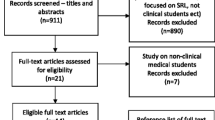Abstract
The ability to guide one’s own learning is an essential skill for the health professional. The apprenticeship model of undergraduate education offers an opportunity to engage in self-regulated learning as students work to set goals, evaluate the available opportunities and seek out those with the greatest potential for learning. A close examination of how students navigate their clinical rotations could therefore foster greater understanding of how students learn to guide their own learning. The study presented here aimed to examine undergraduate medical students’ day-to-day learning strategies in order to better understand the process of informal self-regulated learning in practice. As a secondary objective, we sought to provide a forum for students to share and critically reflect on their own self-regulated learning strategies. A series of focus groups were conducted with medical students on a surgical rotation. Participants were asked to discuss issues relating to the strategies and behaviours that they had implemented in order to maximize their educational experience. Three distinct approaches to informal self-regulated learning were identified: Participants articulated tendencies to acquiesce to a perceived lack of learning opportunities choose from available learning opportunities and create their own learning opportunities. The results are interpreted through the lens of self-regulated learning theory and implications for medical education are discussed.
Similar content being viewed by others
References
Bandura, A. (1986). Social foundations of thought and action: A social cognitive theory. Englewood Cliffs, NJ, US: Prentice-Hall, Inc.
Bravata, D. M., Huot, S. J., Abernathy, H. S., & Skeff, K. M. (2003). The development and implementation of a curriculum to improve clinicians’ self-directed learning skills: A pilot project. BMC Med Educ, 3, 7.
Brydges, R., Dubrowski, A., & Regehr, G. (2010). A new concept of unsupervised learning: Directed self-guided learning in the health professions. Academic Medicine, 85(10 Suppl), S49–S55.
Butler, D. L. (2002). Qualitative approaches to investigating self-regulated learning: Contributions and challenges. Educational Psychologist, 37(1), 59–63.
Butler, D. L., Schnellert, L., & Cartier, S. (2008). Layers of self-regulation: Teachers working strategically to improve practice so as to foster students’ self-regulation. Paper presented at the annual meetings of the American Educational Research Association (AERA), New York.
Evensen, D. H., Salisbury-Glennon, J. D., & Glenn, J. (2001). A qualitative study of six medical students in a problem-based curriculum: Toward a situated model of self-regulation. Journal of Educational Psychology, 93(4), 659–676.
Frank, J. R. (Ed.). (2005). The CanMEDS 2005 physician competency framework. Better standard s. Better physicians. Better care. Ottawa: The Royal College of Physicians and Surgeons of Canada.
Ginsburg, S., McIlroy, J., Oulanova, O., Eva, K., & Regehr, G. (2010). Toward authentic clinical evaluation: Pitfalls in the pursuit of competency. Academic Medicine, 85(5), 780–786.
Kuzel, A. J. (1999). Sampling in qualitative inquiry. In B. F. Crabtree & W. L. Miller (Eds.), Doing qualitative research (2nd ed.). Thousand Oaks, California: Sage Publications Inc.
Merriam, S. B. (1998). Qualitative research and case study applications in education. San Francisco: Jossey-Bass.
Murad, M. H., & Varkey, P. (2008). Self-directed learning in health professions education. Annals of the Academy of Medicine, Singapore, 37(7), 580–590.
Mylopoulos, M., & Regehr, G. (2009). How student models of expertise and innovation impact the development of adaptive expertise in medicine. Medical Education, 43(2), 127–132.
Nousiainen, M., Brydges, R., Backstein, D., & Dubrowski, A. (2008). Comparison of expert instruction and computer-based video training in teaching fundamental surgical skills to medical students. Surgery, 143(4), 539–544.
Paris, S. G., Byrnes, J. P., Paris, A. H., Zimmerman, B. J., & Schunk, D. H. (2001). Constructing theories, identities, and actions of self-regulated learners. In: Self-regulated learning and academic achievement: Theoretical perspectives (2nd ed., pp. 253–287). Mahwah, NJ, US: Lawrence Erlbaum Associates Publishers.
Patton, M. Q. (1990). Qualitative evaluation and research methods. Newbury Park, CA: Sage Publications, Inc.
Scardamalia, M., & Bereiter, C. (2003). Knowledge building. In encyclopaedia of education vol 2nd (pp. 1370–1373). New York, USA: Macmillan Reference.
Schunk, D. H., & Zimmerman, B. J. (2001). Social cognitive theory and self-regulated learning. In: Self-regulated learning and academic achievement: Theoretical perspectives (2nd ed.). (pp. 125–151). Mahwah, NJ, US: Lawrence Erlbaum Associates Publishers.
Vygotsky, L. (1978). Interaction between learning and development (trans: M. Cole). In: M. Cole, V. John-Steiner, S. Scribner & E. Souberman (Eds.), Mind in Society: The development of higher psychological processes. L.S. Vygotsky (pp. 79–91). Cambridge, Mass: Harvard U Press.
Zimmerman, B. J. (1989). A social cognitive view of self-regulated academic learning. Journal of Educational Psychology, 81(3), 329–339.
Zimmerman, B. J. (2000). Self-efficacy: An essential motive to learn. Contemporary Educational Psychology, 25(1), 82–91.
Author information
Authors and Affiliations
Corresponding author
Rights and permissions
About this article
Cite this article
Woods, N.N., Mylopoulos, M. & Brydges, R. Informal self-regulated learning on a surgical rotation: uncovering student experiences in context. Adv in Health Sci Educ 16, 643–653 (2011). https://doi.org/10.1007/s10459-011-9285-4
Received:
Accepted:
Published:
Issue Date:
DOI: https://doi.org/10.1007/s10459-011-9285-4




